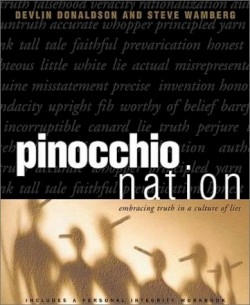
Pinocchio Nation
Embracing Truth in a Culture of Lies
In an age when people have become “moral sneaks,” collectively avoiding rather than embracing the truth, Donaldson and Wamberg ask with Mark Twain, “Where are the ‘merely honest’ people?” and how do we become honest? With a mix of philosophy and practical application, they have provided a Christian perspective on the relativism and “ethics of exception” that characterize the postmodern world. Lively examples culled from years of experience clearly show how truth-avoidance undermines the fabric of trust upon which viable social interactions are built.
Both authors have been on the staff of Compassion International. Donaldson holds an M.A. in counseling psychology from Trinity Evangelical Divinity School and is the author of How to Be a Great Boss without Being Bossy. Wamberg earned a Master of Divinity degree from Northern Baptist Theological Seminary in Illinois and has co-authored several books. The authors share a concern for the current state of affairs in which, according to the Barna Research Group, nearly one-third of Americans polled believe that “the way things are today, lying is sometimes necessary.”
The confusion surrounding truth-telling in daily life is attributed to the desire for an “easy way out” of unpleasant situations, and to some of the deliberate ways in which the truth is misused. Often it will be used as a “shield” (making a partially true statement to protect ourselves) or as a “weapon” (making true statements to achieve revenge and cause pain). It may also be used as a “diversion” (bringing up something hurtful to turn the conversation away from oneself or to end it). These misuses of the truth allow one to avoid personal responsibility for situations gone wrong. As a corrective, the “Rule of Truth” is suggested: “No one has the right to tell someone else ‘the truth’ until they have spent the time, energy and focus to learn the truth about themselves.” This means being willing to face the pain of self-discovery and use it to fuel a lifelong process of growth in integrity.
Included is a workbook to help readers put what they’ve learned into practice. It clarifies such problems as the difference between tact and “little white lies” and how telling the truth does not equal attack. Personal stories from the authors’ lives are encouragement to succeed in making honesty a habit.
Reviewed by
Kristine Morris
Disclosure: This article is not an endorsement, but a review. The publisher of this book provided free copies of the book to have their book reviewed by a professional reviewer. No fee was paid by the publisher for this review. Foreword Reviews only recommends books that we love. Foreword Magazine, Inc. is disclosing this in accordance with the Federal Trade Commission’s 16 CFR, Part 255.
